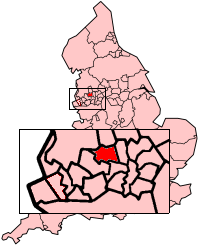
The first elections to Bolton Metropolitan Borough Council were held on Thursday, 10 May 1973, with the entirety of the 69 seat council - three seats for each of the 23 wards - up for vote. It was the first council election as the newly formed metropolitan borough under a new constitution. The Local Government Act 1972 stipulated that the elected members were to shadow and eventually take over from the County Borough of Bolton, the Municipal Borough of Farnworth, the Urban Districts of Blackrod, Horwich, Kearsley, Little Lever, and Westhoughton, and the southern part of Turton Urban District on 1 April 1974. The order in which the councillors were elected dictated their term serving, with third-place candidates serving two years and up for re-election in 1975, second-placed three years expiring in 1976 and 1st-placed five years until 1978.
Contents
- Election result
- Ward results
- Astley Bridge ward
- Bradshaw North and South ward
- Bradford ward
- Bromley Cross, Eagley and Egerton ward
- Church East and North ward
- Darcy Lever cum Breightmet ward
- Deane cum Lostock ward
- Derby ward
- Farnworth North ward
- Farnworth South ward
- Great Lever ward
- Halliwell ward
- Heaton ward
- Horwich North, Central and East ward
- Horwich South and Blackrod ward
- Hulton and Rumworth ward
- Kearsley ward
- Little Lever ward
- Smithills ward
- Tonge ward
- West ward
- Westhoughton East and Hulton ward
- Westhoughton North, Central and South ward
- References
The Conservative Party took control of the new Council by a majority of 1. The Leader of the council was Councillor John Hanscomb, who held this position until Labour took control in 1980.